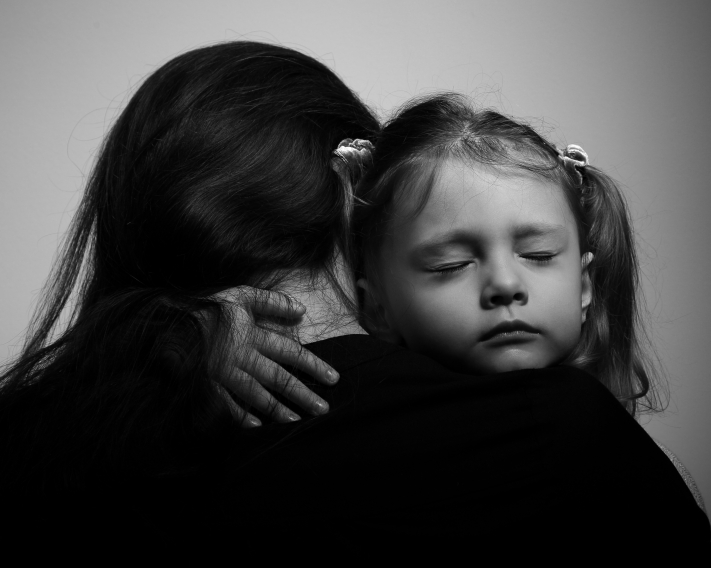Talking to Children about Terrorist Attacks and School and Community Shootings in the News

Parents’ guide for talking to their children
-
Why should I talk about this with my children?
-
What questions are children likely to have?
They will ask what happened.
Children and teenagers are better able to cope with upsetting news when they understand more about the upsetting event. They need information just as adults do. Begin by asking your child or teenager what they already understand about the tragic shooting. They have likely heard about it on TV, at school, or from their friends. However, much of their information may not be accurate. As they explain what they know about the shooting, you can figure out what it is they don’t already know or understand. Look for misunderstandings or frightening rumors. Tell the truth and do not try to mislead them “for their own good.” Children of different ages understand and react differently according to their developmental age and unique personal experiences. It is important to remember that we cannot assume that children’s worries are the same as our own. When we listen to our children and come to understand their feelings and worries, we can better help them make sense of these experiences and how they affect us all.
The amount of details that children will find useful will depend upon their age. The older the child is, the more details will likely be needed to answer their concerns. Provide the basic information in simple and direct terms and then ask for questions. Take your cues from your child in determining how much information to provide. Older children may wish to discuss the larger implications of the event. Provide reassurance whenever possible. Our government and police are taking steps to protect us from something like this happening again and keep us safe. Children often look for reassurance that they are now safe after such graphic reminders of danger and hatred take place close to their home and in city usually associated with happy memories. Terrorist acts such as this remind us all that we are never completely safe – but now is the best time to reassure children that they can and should feel safe in their school, in their home, and in their community.
Could I have done anything to prevent this?
After a tragic event, we all wonder what we and others could have done to prevent this from happening.
Even when it is obvious that there is nothing your child or teenager could have done to prevent or minimize the crisis, they may still feel helpless and wish they could have changed what happened. Let children know that this is a normal reaction; we all wish that there is something we could have done to prevent this or any tragedy. Instead, suggest that together you and your child can concentrate on what can be done now to help those most directly affected and to ensure safety, tolerance and acceptance in our communities.
Whose fault is it?
In some ways, blaming is a way to feel as if you can regain control of uncomfortable feelings and the risk being felt. While it is natural to engage in thoughts of blame, this doesn’t ease the immediate feelings of grief and fear nor does it provide any solutions for the future. It is understandable that people would be angry at the individuals who commit acts of terrorism and hatred, but sadly sometimes people are also angry at those people that are easier to find and blame – such as people who look like they might belong to the group that was responsible. Children should be told that although it is normal to feel angry, terrorists do not represent a particular race or ethnic group. The shooting may also cause children and teenagers to become frightened that they may be targeted by people because they may fear others do not approve of who they are. We as Americans take pride in having members of many different races, sexual orientations and ethnic backgrounds. This is a time to join together and continue to be inclusive, accepting and supportive to all who seek peace.
Is this going to change my life?
This is a question that we all struggle to answer, not only for our children but also for ourselves. Especially in difficult times, children may act immaturely. Teenagers may want to spend more time with their peers. Children and teenagers are often very concerned about themselves. When there is a tragic event, they may become even more concerned about what affects them personally. Adults who do not understand this may see this as being selfish or uncaring. It is important to make your children feel comfortable in asking questions and expressing their feelings. Expect your children to think more about themselves for the time being. Once they feel reassured that they are being listened to and their needs will be met, they are more likely to be able to start to think about the needs of others.
Can I help?
Once children start to feel safe and understand what is going on, many will want to help. While there may be little that they can do now to help the immediate victims of this crisis, there is a lot they can do to help. They can start by taking care of themselves – telling you when they are upset or worried, being honest and open. They can also offer help to other members of their community – their friends and classmates, their teacher, and other adults. Over time, they can think about how they, along with other members of their community, might be able to do something helpful for the victims and survivors.
Some of the questions my child asks are so painful to respond to. I don’t want to make things worse, so should I say nothing instead?
Often what children and teenagers need most is to have someone they trust listen to their questions, accept their feelings, and be there for them. Don’t worry about knowing the perfect thing to say – there is no answer that will make everything okay. Listen to their concerns and thoughts, answer their questions with simple, direct and honest responses, and provide appropriate reassurance and support. While we would all want to keep our children from ever having to hear about something like this, reality does not allow this. Being silent on the issue won’t protect them from what happened, but only prevent them from understanding and coping with it. Remember that answers and reassurance should be at the level of the child’s understanding.
What if this upsets them?
During these discussions, children may show that they are upset – they may cry, get anxious or cranky, or show you in some other way that they are upset. Remember, it is the events that are upsetting them, not the discussion. Talking about the event will permit them the opportunity to show you how upset they really are. This is the first step in coping with their feelings and adjusting to their new understanding of the world. Pause the conversation periodically so that you can provide support and comfort to your child and ask if he or she wishes to continue the discussion at another time. But it is helpful for them to realize that it is okay to show you when they are upset. Otherwise, they may try to hide their feelings and will then be left to deal with them alone.
What if they don’t ask any questions – should I bring it up? What if they don’t seem to want to talk about it?
When a major crisis of this nature occurs, it is a good idea to bring the topic up with your children, no matter how young they are. At first, older children and teenagers may tell you that they don’t want to or need to discuss it. It is generally not a good idea to force them to talk with you, but do keep the door open for them to come back and discuss it later. Be available when your child is ready to talk, but let them choose the time. Often children find it easier to talk about what other children are saying or feeling instead of talking about themselves.
How can I tell if my child needs more than I can provide? Where would I go for such help?
When there is a tragedy of this size occurs, most people will be upset. However, should your child or teenager continue to be very upset for several days and is unable to recover from their fears, or they are having trouble in school, home or with their friends, then it is a good idea to speak with someone outside the family for advice. The shooting may have triggered other distressing experiences, worries or concerns of your child. You may wish to speak with your child’s teacher or school counseling services, pediatrician, mental health counselor or member of the clergy for advice. Please remember that you shouldn’t wait until you think they NEED counseling – you should take advantage of counseling and support whenever you think it will be helpful.
What if I have more questions? Where can I turn for answers?
Visit the National Center for School Crisis and Bereavement or National Child Traumatic Stress Network or the National Association of School Psychologists

